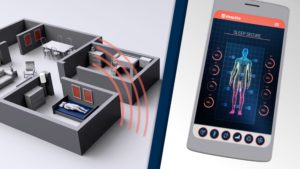Australian-based research and technology company Sleeptite, has today announced its non-invasive sensor monitoring system, REMi, will be used in a world-first sleep disorder diagnosis evaluation and monitoring trial.
The REMi Sleep Diagnosis Evaluation Trial will be conducted in partnership with researchers from Flinders University and RMIT University and will see the REMi platform of invisible mattress sensors tested for their capability as a sleep disorder validation tool.

Sleeptite’s REMi, launched in March, has been designed to non-intrusively monitor aged care residents off the surface of a mattress providing insight into their presence, position, posture and sleep health status.
The REMi platform will now be put to the test by experts from the Flinders Health and Medical Research Institute Sleep Health team at Flinders University in collaboration with the Functional Materials and Microsystems Research Group at RMIT.
“When we set out to develop REMi, our entire collaboration team knew we had a product that had the potential to provide sleep diagnostic information outside of an aged care setting,” Sleeptite CEO Cameron van den Dungen said.
“With a recent report from the Sleep Health Foundation and Deloitte showing 1 in 10 Australians suffer from a sleep disorder at a national economic cost of $14.4 billion there has never been a greater need for research in this space.
“I am so excited to see further scientific research show how the Sleeptite REMi platform can be used as a sleep diagnostic tool to determine sleep disorders such as sleep apnoea,” he continued.
The REMi Sleep Diagnosis Evaluation Trial, conducted at Flinders University’s Adelaide research centre, is expected to last six months and will include:
- further sensor capability testing of the REMi sensors
- identifying key sleep-related parameters
- establishing relationships between sensor signals and sleep measurements, and
- developing an algorithm that will recognise sleep quality
The REMi Sleep Diagnosis Evaluation Trial will involve 30 participants and will be evaluated against polysomnography (PSG) results, which are considered the current industry gold standard for sleep evaluation.
“REMi is a nearable technology, which has been designed to ensure the person being monitored by the sensors is unaware of their presence,” Sleeptite CEO, Cameron van den Dungen said.

The multidisciplinary team at Flinders University includes clinical, psychology, physiology and engineering experts who understand respiratory and non-respiratory sleep disorders and other aspects of sleep science.
They will be supported by the Flinders University Medical Device Research Institute, led by Professor Karen Reynolds.
The REMi Sleep Diagnosis Evaluation Trial was made possible due to funding received from the CRC for Alertness, Safety and Productivity (Alertness CRC) which was part of the Australian Government’s Cooperative Research Centres (CRC) Program.
** Sleep Health Foundation – Rise and try to Shine Report
Key stats
- 1 in 10 Australians have a sleep disorder that can substantially affect their wellbeing, safety and productivity.
- In the last financial year (2019-20) poor sleep cost the Australian economy $14.4 billion
- This equates to 0.73% of Australian GDP
- Less than 7% of these costs are for sleep disorder treatments
- Non-financial costs of the loss of wellbeing totalled an additional $36.6 billion
- This represents 3.2% of total Australian burden of disease for the year.
- These costs were distributed across the three major sleep disorders – obstructive sleep apnoea, insomnia and restless legs syndrome.

